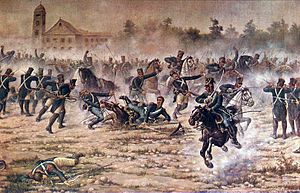Battle of San Lorenzo
| Battle of San Lorenzo | |||||||
|---|---|---|---|---|---|---|---|
| Part of Second Banda Oriental campaign | |||||||
 Painting of the battle by Ángel della Valle. |
|||||||
|
|||||||
| Belligerents | |||||||
|
|
|
||||||
| Commanders and leaders | |||||||
|
|
|
||||||
| Strength | |||||||
| 140 grenadiers 70 militias |
250 soldiers 2 cannon |
||||||
| Casualties and losses | |||||||
| 16 dead 22 wounded |
40 dead 14 wounded and captured 2 cannon |
||||||
The Battle of San Lorenzo was fought on February 3, 1813 in San Lorenzo, Argentina, then part of the United Provinces of the Río de la Plata. A Spanish Royalist force under the command of Antonio Zabala was defeated by the Regiment of Mounted Grenadiers, under the command of José de San Martín. This battle was the baptism of fire for this military unit, and for San Martín in the Spanish American wars of independence.
Montevideo, a royalist stronghold during the Argentine War of Independence, was under siege by José Gervasio Artigas. Those in the city raided population centres along the nearby rivers for supplies. José de San Martín, who shortly before had arrived in Buenos Aires and formed the regiment, followed the royalist ships to San Lorenzo. The area around San Lorenzo formed a large empty plain, so the regiment hid inside the San Carlos convent during the night and San Martín studied the battlefield and the enemy ships from the tower. The battle started at dawn, when the grenadiers made a surprise pincer movement to trap the enemy forces. One column was led by San Martín, and the other by Justo Germán Bermúdez. San Martín fell from his horse, and was nearly killed, but Juan Bautista Cabral and Juan Bautista Baigorria intervened and saved him. The royalists were defeated, but continued to raid villages for some more time afterwards.
This battle was the only one that San Martín fought on the modern territory of Argentina. The city of San Lorenzo keeps historic memorials of the battle and it is referenced in the San Lorenzo march.
...
Wikipedia
